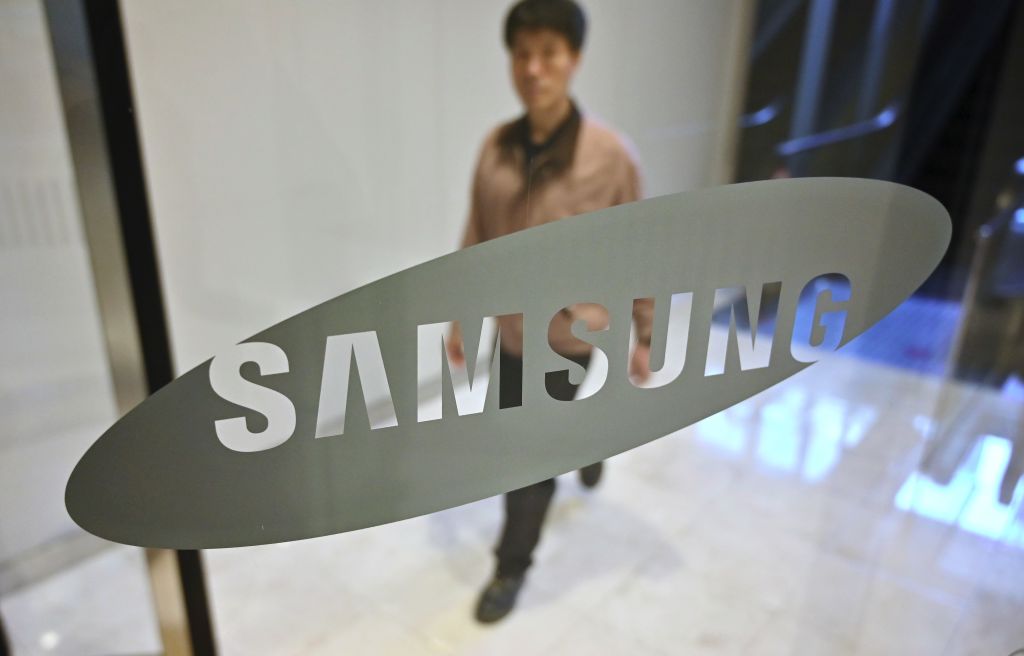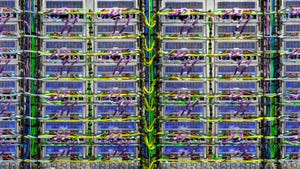Trade-War Lull, Data Center Orders Spur Chip-Price Comeback, Boost Samsung
The South Korean tech giant's recent quarterly earnings beat estimates after memory chip prices began to climb out of a persistent downturn.
January 8, 2020

Sohee Kim (Bloomberg) -- Samsung Electronics Co.’s quarterly earnings beat estimates after memory chip prices began to climb out of a persistent downturn.
The world’s largest memory chip maker reported a 34% fall in operating income to 7.1 trillion won ($6.1 billion) in the three months ending December, according to preliminary results released Wednesday by the Suwon, South Korea-based company. That compares with the 6.49 trillion won average of analysts’ estimates.
Company shares rose as much as 1.4% in early trading following the earnings guidance.
Global chip prices -- the biggest determinant of Samsung’s bottom line -- have shown signs of escaping a protracted slump, helped along by the easing of trade tensions between the U.S. and China and boosted by orders from data center operators. Demand for DRAM chips used in smartphones and servers is projected to rise in line with technology advances that require more and better silicon.
“The fundamental of Samsung’s chip business is great,” said Jeon Kyung-dae, chief investment officer for equities at Macquarie Investment Management Korea. “Memory chip prices already turned around in the fourth quarter and the recovery has started earlier than the market’s expectation. Samsung is expected to ramp up capital expenditure in its memory business this year.”
Wall Street has been predicting a recovery in semiconductor demand -- hammered in 2019 by flagging mobile gadget sales and a slowing expansion in cloud computing -- and expects the market for computer and smartphone components will return to growth in the second half of 2020. Micron Technology Inc. told investors last month the worst was over for the memory-chip industry.
What Bloomberg Intelligence Says
NAND prices improved sequentially and DRAM’s descent slowed, even though the fourth quarter is a typically slow season. A strong demand comeback from server customers may restore Samsung’s inventory back to normal levels earlier than expected in 2020.
- Anthea Lai, analyst
Sales for the fiscal fourth quarter were 59 trillion won, falling shy of the 60.9 trillion won consensus projection. Samsung didn’t provide net income or break out divisional performance, which it will do later this month when it releases final results.
Contract prices for 32-gigabyte DRAM server modules fell about 5.3% in the December quarter, narrower than the 14% slide of the September quarter, according to InSpectrum Tech Inc. Prices for 128-gigabit MLC NAND flash memory chips held steady in the final three months of 2019.
Samsung shares soared 44% in 2019 on expectations for an uptrend in demand in 2020. The growing shift toward 5G wireless technology and cloud computing will drive chip business growth, said CW Chung, head of Korea equity research for Nomura International in Seoul.
The company is spending more on the development of flexible organic light-emitting diode panels for smartphones, hoping to maintain its lead in the mobile display market. But its older LCD business shut some facilities after panel prices collapsed in the face of competition from Chinese suppliers such as BOE Technology Group Co. “The division is likely to face that cost pressure in 2020 as well, but its overall operating income is poised to increase, driven by higher utilization rates for flexible OLED,” Daishin Securities Co. analyst Lee Su-bin said in a note on Dec. 23.
In mobile devices, Samsung is expected to report lower-than-expected shipments of smartphones for the quarter but its average selling price probably increased thanks to the Galaxy Fold, a $1,980 Android device that opens up like a book.
Samsung is expected to unveil on Feb. 11 in San Francisco a second foldable device that folds into a square. The company’s mainstream flagship device -- whose name is rumored to be the Galaxy S20, a change in namingscheme -- is also likely to be unveiled at that event.
Samsung said its devices accounted for 54% of the global 5G smartphone market as of November 2019, after it shipped more than 6.7 million Galaxy 5G smartphones last year.
About the Author
You May Also Like



.jpg?width=300&auto=webp&quality=80&disable=upscale)





